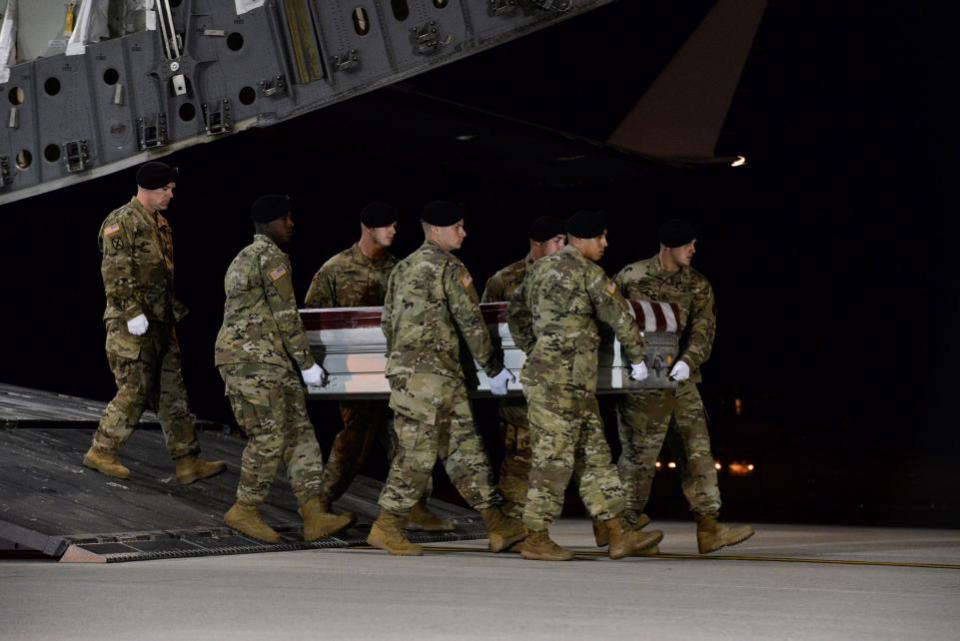Why FBI Is Probing Attack on U.S. Soldiers in Africa
On October 4, Sgt. La David Johnson, Staff Sgt. Bryan Black, Staff Sgt. Jeremiah Johnson and Staff Sgt. Dustin Wright were killed when their 12-member team was ambushed by 50 radical Islamists Washington believes are linked to the Islamic state militant group (ISIS).
Details about their deaths remain cloudy more than two weeks later. Lawmakers have criticized the Trump administration’s lack of transparency and inability to disclose information that explains what led to the ambush on the soldiers providing counter-terrorism advice to Nigerien forces.
The Pentagon has defended the 48 hours it took to retrieve the body of Sgt. Johnson, denying that he was left behind. “We don’t leave anyone behind. He was separated,” chief Pentagon spokesperson Dana White said.
The U.S. Africa Command had been leading the probe into the attack and the circumstances surrounding it. Now, the FBI has entered the investigation, the Wall Street Journal reported Thursday, a move that suggests the U.S. military and Trump administration require assistance piecing together what happened on that day.
The fact that the domestic security service has had to intervene appears to compound criticism of the officials overseeing the aftermath for two weeks. However, the FBI has said this sort of investigation is routine, as it regularly opens investigations into cases, at home or abroad, that involve Americans and could be linked to extremist groups. The agency has existing personnel in the West African country where jihadi groups—including the group blamed for the attack, the Islamic State in Greater Sahara (ISGS)—move across the lawless Sahel desert region.
The FBI has helped in past cases involving the deaths of U.S. soldiers, for example the murder of three U.S. military trainers by a Jordanian at King Faisal Air Base on the outskirts of Amman on November 4, 2016. As the soldiers—Staff Sgt. Matthew C. Lewellen; Staff Sgt. Kevin J. McEnroe; and Staff Sgt. James F. Moriarty—waited at the base’s gate, a Jordanian soldier First Sgt. Ma’arik al-Tawayha opened fire. He was sentenced to life in prison in July.
The agency has the authority to take charge of the entire investigation but has not acted to do so yet, only playing a contributing role. It will assess the militants who attacked the group and how they had information about the soldiers’ whereabouts.

The scrutiny around the ambush is set to continue, with top Republican lawmakers calling for greater disclosure in a classified or public setting. Sen. John McCain, chairman of the Senate Armed Services Committee Chairman, is threatening to use legislative measures to draw more information from Trump officials about the attack.
“We are coequal branches of government; we should be informed at all times,” he said. “We’re just not getting the information in the timely fashion that we need.”
McCain added: “There’s a mindset over there that they’re a unicameral government.”
He said he would use “everything, everything, everything” to get the full facts of the ambush, going as far as “a subpoena” if necessary.
Other members of the committee were just as critical, alleging that Congress did not know the reason for special forces soldiers to be deployed to Niger, let alone on that deadly mission.
“These four soldiers being killed and most people not knowing what they were up to is a game changer," said Sen. Lindsey Graham, a member of the Senate Armed Services Committee, the Journal reported. "I'm concerned that we're not regularly briefed about operations.”
“I’m all for going after terrorists,” Graham added, “but I want to know before I read about it in the paper where our people are and what they’re doing.”
McMaster said on Wednesday that he would brief lawmakers on Capitol Hill as soon as he could do so. White House Chief of Staff John F. Kelly admitted that there was more information known than had been disclosed to lawmakers or to the public. That is unlikely to change any time soon if the White House has its way.
“I’ve read the same stories you have,” he said, according to the Washington Post. “I actually know a lot more than I’m letting on, but I’m not going to tell you.”
Related Articles


